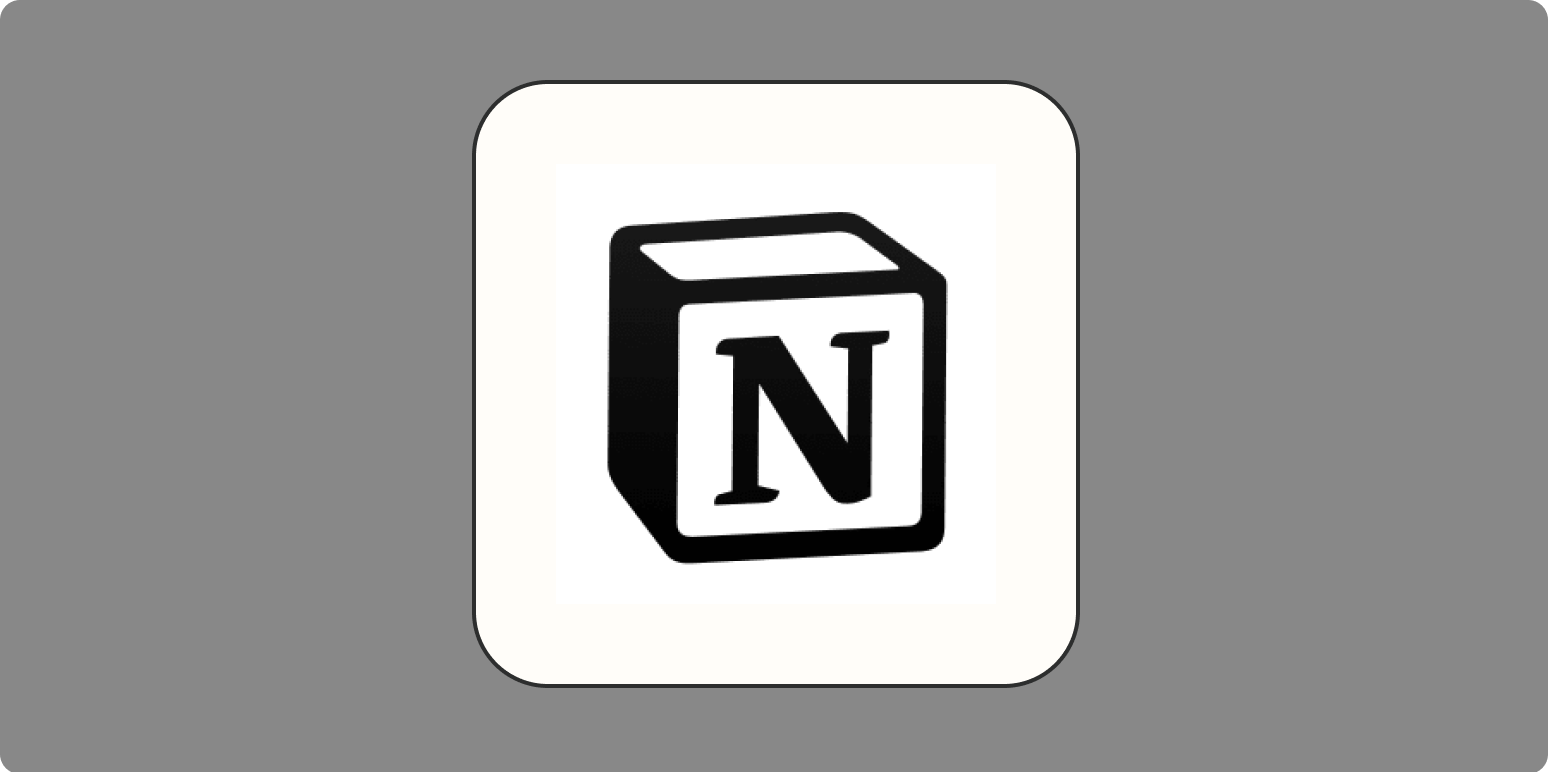Notion has had a meteoric rise over the past few years, but—no big deal—I’ve been using Notion since before it was cool. And when I needed to update my portfolio earlier this year, I started drafting the site’s content in Notion.
I was dreading needing to design and build a website, wishing I could just show people the Notion doc instead. Then I realized…wait a minute, I think I can.
And about five minutes later, my personal site was born. Here’s how you can do the same.
How to build a website on Notion
Publishing a website via Notion is quick and simple, but there are ways to add more complexity and customization as well. I’ll walk you through two different ways to create your website with Notion.
The easy way
Publishing a Notion doc the easy way really couldn’t be much easier. To turn your Notion doc into a website, all you have to do is click the Share button in the top-right corner, then click the Share to web toggle.
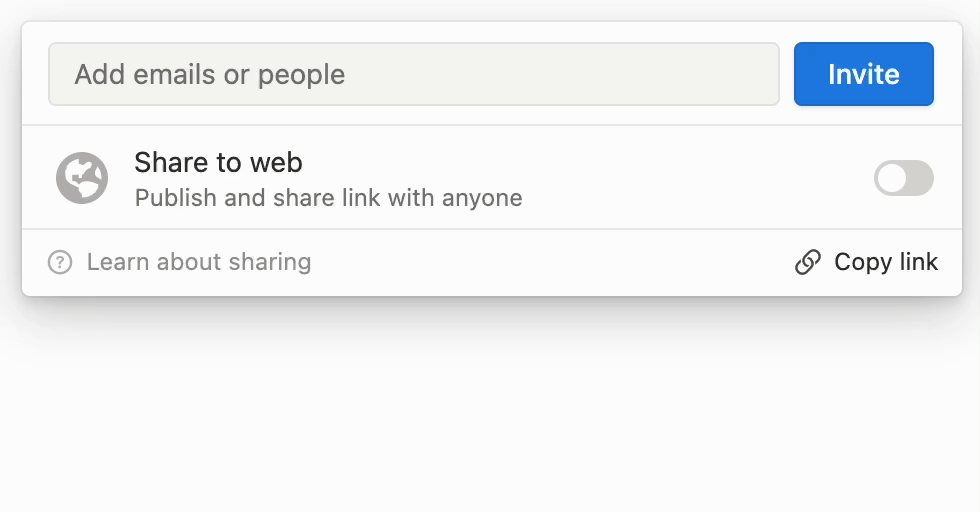
Voilà, you’re done! You’ll have an exact clone of your Notion doc living on the web for anyone with the link to access.
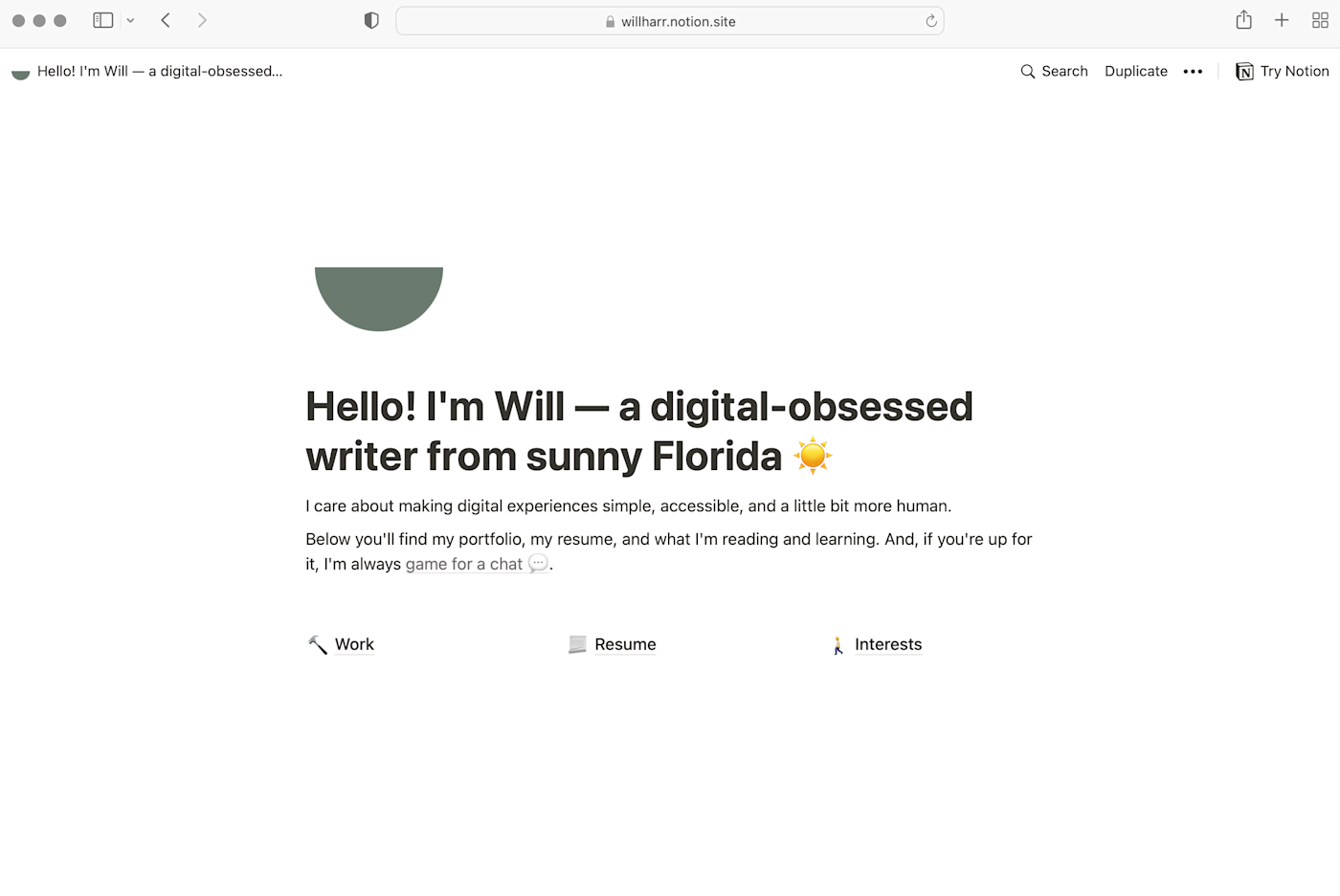
You’ll notice that Notion doesn’t give you the prettiest URL to direct visitors to when you publish a page. But for anyone with a Personal Pro plan, there’s a way to fix this.
To shorten that URL, click Settings & members in the left sidebar, then navigate to the Settings tab.
Under the Domain section, you can customize what your Notion workspace URLs will look like. Notion gives you a URL by default to start with, like wills-workspace.notion.site, but you can customize the first part of that URL to whatever you’d like.

Then, in the Public home page section, you can select which public page you want to serve as your homepage.

So, rather than the site being published under a domain like https://willharr.notion.site/Hello-I-m-Will-a-digital-obsessed-writer-from-sunny-Florida-1e8260d484014c29ba9551c029fe22d7, I can simply direct people to willharr.notion.site.
The still-pretty-easy way
I’m calling this the still-pretty-easy way because calling it “the hard way” doesn’t seem totally fair. Compared to other ways to create and publish a website, this is still a breeze.
You’ll notice that, when publishing your Notion doc, there were some limitations. Mainly:
-
Your site looks exactly like a Notion doc. The layout and typeface stay the same.
-
Your site has to live on a notion.site URL rather than another domain.
-
There’s a Notion call-to-action button in the top corner of your published site.
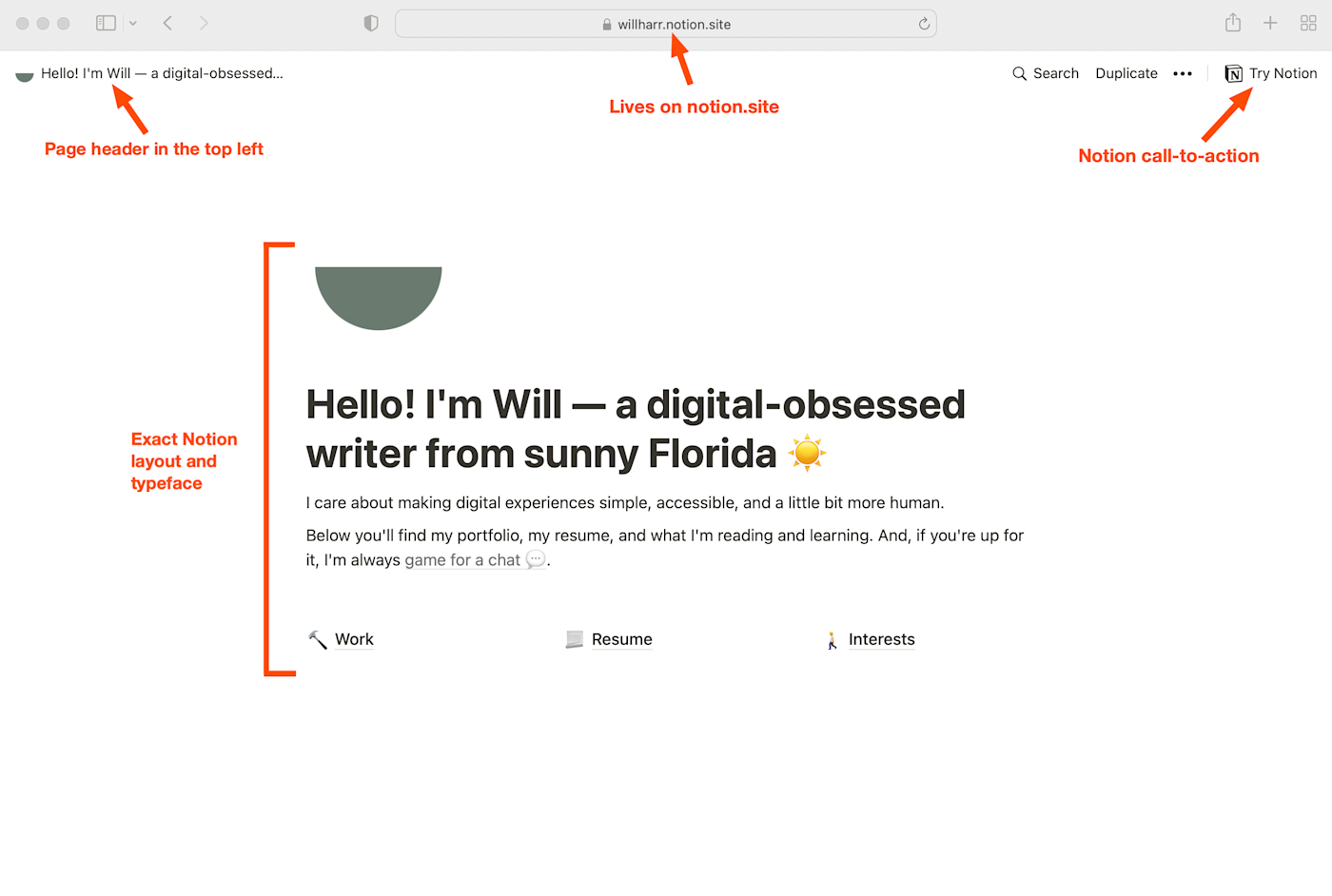
This might be fine in some cases, like if you’re publishing an internal doc to share with your team at work, but when I was creating a personal site, I wanted to build something with a little more polish.
I did some research and found that there are third-party options, like Super or Potion, that let you customize your published Notion doc and turn it into a full-fledged website. Using Super, I was able to:
-
Publish to willharr.com, rather than willharr.notion.site
-
Create custom URLs for the sub-pages on my website
-
Change the style of my website—like the typeface and color scheme
-
Add a navigation bar to the top of the site
-
Get rid of the Notion call-to-action in the top corner
-
Add password protection to my portfolio page
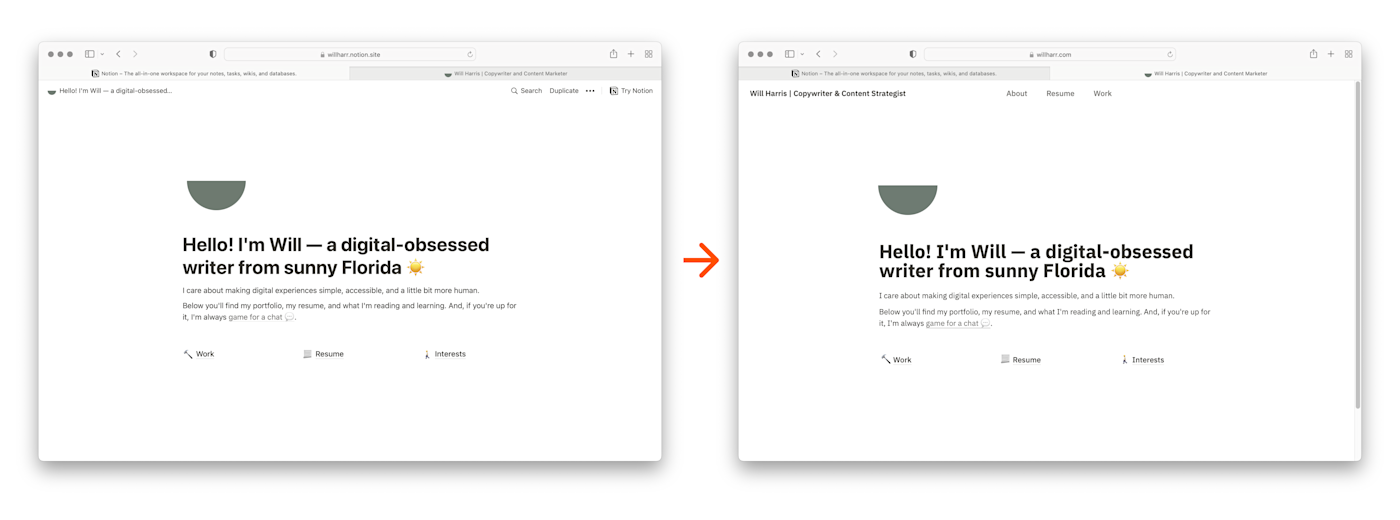
These details are small, but they go a long way in making your website feel just a little bit more polished and professional, all while still being able to update it in real-time just by editing your Notion doc.
The pros of building a website with Notion
Ok, we’ve covered the how. But with countless other options out there for building a website, why should you build a website with Notion?
1. Creating and editing is lightning fast
Choosing to build my website with Notion helped me get my website live fast, without worrying too much about the layout or design—which I undoubtedly would have done if I went with another platform.
You can get your Notion site up and running in literally less than a minute. Even if you go the longer route, you can still easily get your site live in less than a day.
2. Making changes is easy
Not only is it easy to get your site live, but it’s also incredibly easy to maintain the site and add new pages. As soon as you change your Notion doc, it’s reflected on your website as well—give or take a couple of minutes.
3. No code is needed (unless you want to)
One of the huge benefits of publishing with Notion is that you don’t have to write any code. You can add some code to further customize your website with Super or Potion, but if you’re publishing on Notion, it’s probably because you don’t want to (or in my case, don’t know how to) code.
The cons of building a website with Notion
I’m obviously a big proponent of building your website on Notion if you can, but the bigger your project is, the faster you’ll start to find the limits of publishing a Notion website.
1. You’re extremely limited in terms of design
I’m not a visual designer, so the constraints that Notion put me in to build a website were totally fine. For someone who needs more flexibility and control over the layout of their website, using Notion probably isn’t the best option. Even if you use one of the third-party tools to give yourself more control, your options for customizing your site design are still limited.
For anyone who wants to flex their design skills while building a no-code site, one of these free website builders will do the trick.
2. Your site won’t scale very well
Using Notion is great if you only need to build a homepage and maybe a few other web pages. The more your site grows, though, the more you’ll realize Notion might not be the right fit.
Super allows you to add a nav bar to your website, but it’s pretty simple. When your site grows, you’ll need to create ways to navigate to different sections of the site, and Notion websites don’t have a great way to make that happen.
3. It’s hard to optimize for SEO
If you just need a website to point people to and aren’t worried about people finding you via search, Notion will serve you just fine. But if you’re counting on showing up in search results, you’ll probably run into some problems with your Notion site.
Notion doesn’t give you any SEO customization options. If you’re using an add-on service like Super or Potion, you can make some search engine optimizations—like page titles and descriptions—but if you’re serious about optimizing your site for SEO, you’ll find your Notion site lacking.
Building a Notion site is right for you if…
If you need to build a small, simple website fast, and don’t need a ton of design flexibility, creating it on Notion is a great option. Its ease of setup and editing, along with its pre-set layout make Notion an appealing choice for anyone who wants to get their site off the ground quickly.
Here are some great use cases for building a Notion website:
-
Portfolio. A small portfolio with a homepage and a few other sub-pages is a great Notion use case. The structure is simple, and Notion makes it easy to add new projects as you go.
-
Product documentation. A self-serve knowledge base can save your customer support team a ton of time while giving your customers a much better experience. Notion is the perfect solution for this, since it’s essentially just a collection of pages and sub-pages.
-
A link-in-bio landing page. With Notion, you can easily build your own Linktree-like landing page to direct people to from your social media profiles.
-
Resume. Notion works well for spinning up an interactive resume that you can update quickly. You could even have different versions for different roles.
-
Personal blog. If you want to create a blog for personal use and you don’t care if it ranks in search results, you won’t find a much easier way to do it than here.
-
Careers page. Need an easy landing page to post job listings? Notion is a great place to do it without having to get into a fancy recruiting tool.
-
Startup landing page. There’s a good chance your company page could grow out of Notion fairly quickly, but that doesn’t mean you can’t build something beautiful that can serve you well in the beginning.
Notion has templates for some of these use cases—and lots of others—that can help you get started.
Automate your Notion website building
As if building a website wasn’t easy enough, you can use Zapier to automate parts of your Notion website. If you’re a writer like me, for example, you could have Zapier create a new database item in Notion every time you publish a WordPress post. Designers can do the same with Dribbble shots.
That way, once you’ve created the initial structure of your site, you can use Zapier to add additional content automatically. Here are some more tips for automating Notion:
Publish your website in minutes
Notion is an all-in-one tool, and all-in-one now includes being a website builder. Getting your Notion site live is as simple as toggling Share to web, so if you want to spend less time designing your site and more time on its content, go ahead and get started.
Related reading:
[adsanity_group align=’alignnone’ num_ads=1 num_columns=1 group_ids=’15192′]
Need Any Technology Assistance? Call Pursho @ 0731-6725516

